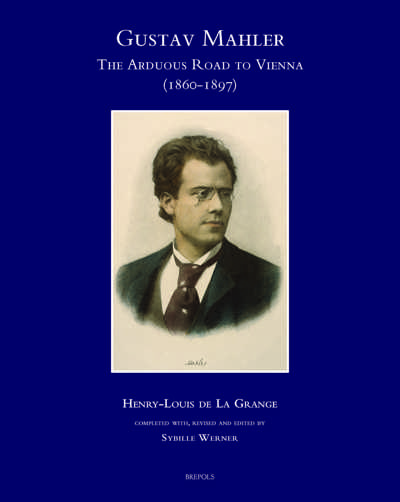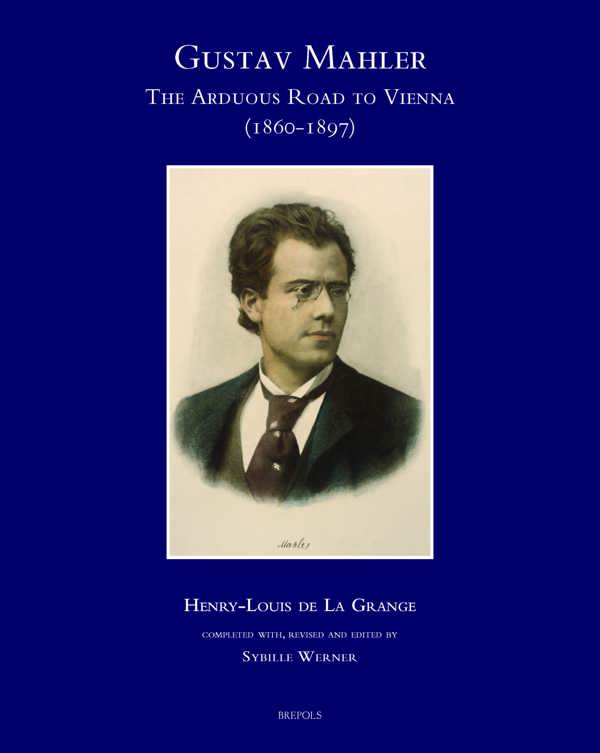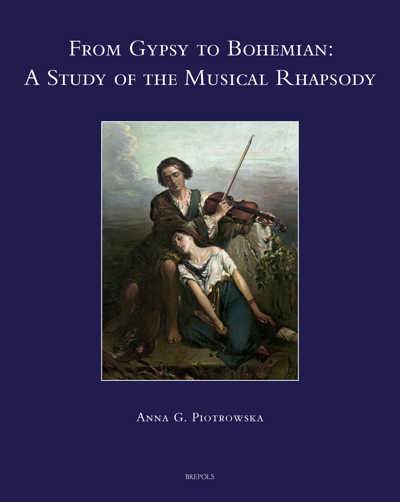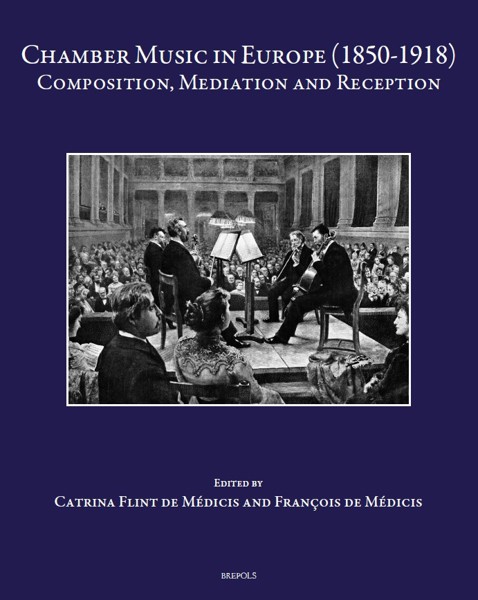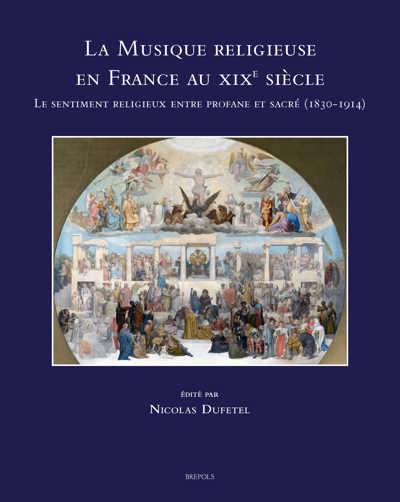
Henry-Louis de La Grange
Gustav Mahler, The Arduous Road to Vienna (1860-1897)
Completed, Revised and Edited by Sybille Werner
Sybille Werner (ed)
- Pages: xvii + 809 p.
- Size:210 x 260 mm
- Illustrations:58 b/w
- Language(s):English
- Publication Year:2020
- € 160,00 EXCL. VAT RETAIL PRICE
- ISBN: 978-2-503-58814-8
- Hardback
- Available
The volume traces the life and career of Mahler from his birth to his appointment to the Vienna Hofoper.
“To conclude: this is in every respect an important and impressive volume—at once both a fitting tribute and a worthy culmination to La Grange’s lifelong devotion to the subject of his now completed biography. We shall all be wandering amongst its treasures for many years to come. I might venture even to celebrate it quite specifically as a great European achievement, not only in the process of its completion but also as a text liberatingly free of the strictures of ‘Chicago-style’ dominated Anglo-American layout and punctuation practice (I rejoice to find authorial full stops and commas falling after the closure of angular quotation-marking ‘Guillemets’). Written by a Frenchman, completed by a German, printed in Italy, and published in Belgium, it is a real treasure.” (Peter Franklin, in Music & Letters, 2022)
Widely recognised as Gustav Mahler's pre-eminent biographer, Henry-Louis de La Grange (1924–2017) – author of the 4-volume, 5,000-page definitive study of the composer's life and work – was awarded a professorship by the government of Austria and an honorary Doctorate from the Juilliard School of Music. He lectured extensively, organised concerts, exhibitions, and music festivals, and contributed to film documentaries and radio features. Together with Maurice Fleuret he founded the Médiathèque Musicale Mahler in Paris.
German musicologist and conductor Sybille Werner started working with Henry-Louis de La Grange in 2003. She has repeatedly lectured and published on the performance history of Mahler's works, and in 2018 received the Mahler Award of the Sociedad Mahler Mexico. Her conducting activities have taken her beyond New York, her former residence, and the USA to Germany, Italy, Japan, Mexico, Poland, and the UK. Currently she is based in Toblach and associated with the Gustav Mahler Music Weeks.
This long awaited revised volume I completes Henry-Louis de La Grange's four-volume English language biography of the Austrian composer Gustav Mahler (1860–1911), which is widely considered to be the definitive work on the subject. The present instalment, covering the years 1860 to 1897, traces the life and career of Mahler from his birth in a small village in Bohemia to his appointment to the Vienna Hofoper, then the most prestigious opera house in the world. It describes his family background, his student days at the Vienna Conservatory, his private life, and his burgeoning career as both conductor and composer. Starting at a small summer theatre in Bad Hall, his first engagements took him to Laibach (Ljubljana), Olmütz (Olomouc), Kassel, Prague, and Leipzig, before he was appointed to principal posts at the important opera houses of Budapest (1888) and Hamburg (1891). By now Mahler had also begun to establish himself as a composer. Some of his major works – starting with «Das Klagende Lied» (1881) – the early «Wunderhorn» songs, «Lieder eines fahrenden Gesellen», and the first three symphonies date from this period of his life. While regularly rejected by contemporary critics, today they are favourites of the concert repertoire.
Introduction
Chapter 1
Background – Family – Origins
Chapter 2
Iglau – Childhood: In search of Himself and the World (1860–1874)
Chapter 3
The Conservatory – Matura – University (I) (1875-1878)
Chapter 4
The Conservatory – University (II) – Mahler’s Circle of Friends – Vienna in the 1870s – Wagner, Brahms and Bruckner – Das klagende Lied (I) (1876–1878)
Chapter 5
The Intermediate Years—An Unsettled Existence: Poverty and Passion—Mahler in Search of Himself – Siegfried Lipiner – A Thwarted Love Affair: Josephine Poisl (July 1878 – May 1880)
Chapter 6
Mahler’s first conducting engagements: Bad Hall and Laibach – Das klagende Lied (II) – The Beethoven Prize (June 1880 – April 1882)
Chapter 7
The Saga Society – Vienna and Olmütz – The Carl Theater – Literary Affinities and Passions (April 1882 – May 1883)
Chapter 8
Mahler in Kassel (I) – Prussian Discipline and Bureaucracy – Johanna Richter – Der Trompeter von Säkkingen (May 1883 – August 1884)
Chapter 9
Mahler in Kassel (II) – Conflicts and Passions – The Lieder eines fahrenden Gesellen – The Kassel Festival (August 1884 – July 1885)
Chapter 10
Mahler in Prague – First Major Successes in the Opera House – Don Giovanni, Rheingold, Walküre, Fidelio – Betty Frank – Beethoven’s Ninth – Conflict with Neumann (July 1885 – July 1886)
Chapter 11
Mahler in Leipzig (I) – Rivalry with Nikisch – Nikisch’s Illness (July 1886 – July 1887)
Chapter 12
Mahler in Leipzig (II) – Die Drei Pintos, the First Symphony, and Todtenfeier – Meeting with Strauss – Marion von Weber – Departure from Leipzig – Return to Prague (July1887 – September 1888)
Chapter 13
Mahler as Director of the Royal Hungarian Opera (I) – Reorganisation of the Opera – Das Rheingold and Die Walküre – Death of Bernhard Mahler (September 1888 – May 1889)
Chapter 14
Mahler as Director of the Royal Hungarian Opera (II) – Illness and Personal Misfortunes – Deaths of Marie and Leopoldine Mahler – First Performance of the Symphonic Poem – First Crisis at the Opera – Journey to Italy – Hinterbrühl – Mahler’s Brothers and Sisters (May 1889 – August 1890)
Chapter 15
Mahler as Director of the Royal Hungarian Opera (III) – Meeting with Brahms – Cavalleria rusticana – Géza Zichy – Farewell to Hungary (1890–1891)
Chapter 16
Mahler in Hamburg (I) – The Hamburg Opera – Early Triumphs – Bernhard Pollini – Visit to Scandinavia (March – August 1891)
Chapter 17
Mahler in Hamburg (II) – Bülow and the Todtenfeier – The Humoresken – The German Season in London (August 1891 – July 1892)
Chapter 18
Mahler in Hamburg (III) – Berchtesgaden – The Cholera Epidemic – The Second Symphony – More Family Problems – Steinbach (August 1892 – August 1893)
Chapter 19
Mahler in Hamburg (IV) – Josef Bohuslav Foerster and The Bartered Bride – First Performance of the Humoresken – Contacts with Richard Strauss – The Titan Symphony in Hamburg and Weimar – Bülow’s Funeral (September 1893 – June 1894)
Chapter 20
Mahler in Hamburg (V) – Bruno Walter – The Subscription Concerts – First Partial Performance of the Second Symphony – Death of Otto (June 1894 – May 1895)
Chapter 21
Mahler in Hamburg (VI) – The Third Symphony – First Complete Performance of the Second Symphony – Anna von Mildenburg (June – December 1895)
Chapter 22
Mahler in Hamburg (VII) – Emotional Storms – Failure in Berlin – First movement of the Third Symphony (January – July 1896)
Chapter 23
Mahler in Hamburg (VIII) – Completion of the Third Symphony – Failure in Leipzig – Success in Berlin, Hamburg, and Dresden – The «Call of the God of the Southern Climes» (July 1896 – February 1897)
Chapter 24
Mahler in Hamburg (IX) – Mahler’s Conversion – Relations with Weingartner – Third Failure in Berlin – First International Tour – Departure from Hamburg (February – April 1897)
Appendices
Introduction by Karlheinz Stockhausen (1972)
Catalogue of Mahler's works
Jewish life in Bohemia and Moravia prior to Mahler’s birth
Mahler’s poems
Select Bibliography
Index of Mahler’s Compositions
Index of Names
